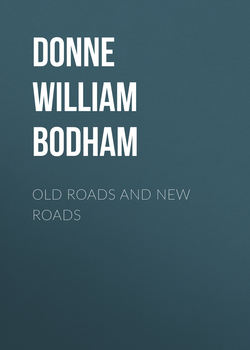Читать книгу Old Roads and New Roads - Donne William Bodham - Страница 1
PREFACE
ОглавлениеGentle Reader,
If you look to move through this little volume in a direct line, after the present fashion of Railway Travelling, you will be signally disappointed. Nothing can well be more circuitous than the route proposed to you, nor more eccentric than your present guide. This book aspires to the precision of neither Patterson nor Bradshaw. Let men “bloody with spurring, fiery hot with speed,” consult those oracles of swiftness and rectitude of way: we do not belong to their manor. We desire to beguile, by a sort of serpentine irregularity, the occasional tedium of rapid movement. We move to our journey’s end by sundry old-fashioned circuitous routes. Grudge not, while you are whirled along a New Road, to loiter mentally upon certain Old Roads, and to consider as you linger along them the ways and means of transit which contented our ancestors. Although their coaches were slow, and their pack-saddles hard as those of the Yanguesan carriers of La Mancha, yet they reached their inns in time, and bequeathed to you and me – Gentle Reader – if we have the grace to use them, many pithy and profitable records of their wayfaring. The battle is not always to the strong, nor the race to the swift: neither is the most rapid always the pleasantest journey. Horace accompanied Mæcenas on very urgent business, yet he loitered on the way, and confesses his slackness without shame —
“Hoc iter ignavi divisimus, altius ac nos
Præcinctis unum: minus est gravis Appia tardis.”
It was, he says, more comfortable to take his time. Is our business more pressing than his was? It can hardly be, seeing that he wended with a company whose errand was to prevent the two masters of the world from coming to blows. In comparison with such a mission, who will put the buying of a cargo of cotton, or arriving an hour before a public meeting begins, or catching a pic-nic party just in the nick of time? St. Bernard rode from sunrise to sunset along the Lake Leman without once putting his mule out of a walk; so much delectation the holy man felt in beholding the beauty of the water and the mountains, and in “chewing the cud of his own sweet or bitter fancies.” And good Michel Seigneur de Montaigne took a week for his journey from Nice to Pisa, although his horse was one of the smartest trotters in Gascony, merely for the pleasure he felt in following the by-lanes. And did not Richard Hooker receive from Bishop Jewell his blessing and his walking-staff, and yet with such poor means of speed he thought not of the weary miles between Exeter and Oxford, but trudged merrily with a thankful heart for the good oak prop, and the better blessing? Much less content with his journey was Richard when he rode to London on a hard-paced nag, that he might be in time to preach his first sermon at St. Paul’s. And was not this, the hastier of his journeys, the most unlucky in his life, seeing that it brought him acquainted with that foul shrew, Joan, his wife, who made his after-days as bitter to him, patient and godly though he were, as wormwood and coloquintida? Are not these goodly examples, Christian and Heathen? Let the Train rush along, you and I will travel at our own pace.
Neither shall you, if you will be ruled by your present guide, saunter along the roads of Britain alone, or on known and extant ways only. Are there not roads which never paid toll, roads in the waste, roads travelled only in vision, roads once traversed by the feet of myriads, yet now overgrown by the forest, or buried deeply in the marsh? Shall we not for awhile be surveyors of these forgotten highways, and pause beside the tombs of the kings, or consuls, or Incas, who first levelled them? The world has moved westward with the daily motion of the earth. Yet, in the far East lie the most ancient highways – whose pavements once echoed with the hurrying feet of Nimrod’s outposts or the trampling of Agamemnon’s rear-guard. It were well to mark how that ancient chivalry sped along their causeways.
Nor, on our devious route, shall baiting-places be wanting. Drunken Barnaby stayed not oftener to prove the ale than we will do: —
“Ægre jam relicto rure
Securem Aldermanni—bury
Primo petii, qua exosa
Sentina, Holburni rosa
Me excepit, ordine tali
Appuli Gryphem Veteris Bailey:
Ubi experrectum lecto
Tres Ciconias indies specto,
Quo victurus, donec æstas
Rure curas tollet mæstas:
Ego etiam et Sodales
Nunc Galerum Cardinalis
Visitantes, vi Minervæ
Bibimus ad Cornua Cervi.”
Our inns may not always be found at the roadside; and we may possibly ever and anon seem to have missed the track altogether. Yet we will come into the main line in the end, and, I trust, part with kindly feelings, when the time has come for saying
SISTE VIATOR
